Banknotes of the Ukrainian hryvnia
Banknotes of Ukrainian hryvnia are the banknotes or bills (in common lexicon) of Ukraine, denominated in Ukrainian hryvnias (UAH, ₴). Currently, they are issued in denominations of ₴1, ₴2, ₴5, ₴10, ₴20, ₴50, ₴100, ₴200, ₴500 and ₴1000. All current notes are issued by the National Bank of Ukraine, which released its first series of notes in 1996. The current series of hryvnia banknotes were introduced into circulation between 2004 and 2006. Banknotes issued in Ukraine can be viewed at the Currency Museum of the National Bank of Ukraine in Kyiv.
Banknotes
In 1996, the first series of hryvnia banknotes was introduced into circulation by the National Bank of Ukraine. They were dated 1992 and were in denominations of 1, 2, 5, 10 and 20 hryven’. The design of the banknotes was developed by Ukrainian artists Vasyl Lopata and Borys Maksymov.[1][2] One hryvnia banknotes were printed by the Canadian Bank Note Company in 1992. Two, five and ten hryvnia banknotes were printed two years later. Until introduction into circulation the banknotes were kept in Canada.[1]
Banknotes of the first series in denominations of 50 and 100 hryven' also existed but due to unknown reasons they were never introduced.
Also in 1996, the 1, 50, and 100 hryvnia notes of the second series were introduced, with 1 hryvnia dated 1994. The banknotes were designed and printed by British printer De La Rue.[3] Since the opening of the Mint of the National Bank of Ukraine in cooperation with De La Rue in March 1994 all banknotes have been printed in Ukraine.[3]
Later, highest denominations were added. The 200 hryvnia notes of the second series were introduced in 2001, followed by the 500 hryvnia notes of the third series in 2006.
All hryvnia banknotes issued by the National Bank continue to be a legal tender. As of 2008, the banknotes of early series can rarely be found in circulation. Also, despite the devaluing of the currency since its introduction, all kopeck coins remain in circulation, as well as all low-value hryvnia bills, including 1 hryvnia.
As with the U.S. dollar, the 1 hryvnia bill is commonly used, and the 1 hryvnia coin is rarely seen. The 100 hryvnia denomination is quite common due to its moderately high value, much as with the US$20 bill. Also common is the 200 hryvnia, as most Ukrainian ATMs dispense currency in this denomination.
The total number of counterfeit hryvnia banknotes in 2015 and 2016 was 2.8 forged bills per 1 million legitimate ones.[4] Almost 10,500 counterfeit hryvnia banknotes worth UAH 3.6 million (U.S. dollar 137,562) were withdrawn from circulation in 2017.[4] The 200 hryvnia is the banknote most counterfeited (61% of all forged banknotes in 2017).[4]
First Series
| First Series | ||||||||||
|---|---|---|---|---|---|---|---|---|---|---|
| Image | Value | Dimensions | Main Colour | Description | Date of | |||||
| Obverse | Reverse | Obverse | Reverse | first printing | issue | withdrawal | lapse | |||
 |
 |
₴1 | 135 х 70 mm | Dark green | Volodymyr the Great of Kyiv | Ruins of Chersonesos | 1992 | 2 September 1996 | 15 July 2003 | 1 October 2020 |
 |
 |
₴2 | Brown | Yaroslav the Wise | Saint Sophia Cathedral in Kyiv | |||||
 |
 |
₴5 | Dark blue | Bohdan Khmelnytsky | A church in the village of Subotiv | |||||
 |
 |
₴10 | Violet | Ivan Mazepa | Kyiv Pechersk Lavra | |||||
 |
 |
₴20 | Yellow and brown | Ivan Franko | Lviv Opera and Ballet Theater | |||||
| These images are to scale at 0.7 pixel per millimetre. For table standards, see the banknote specification table. | ||||||||||
Second Series
| Second Series | ||||||||||
|---|---|---|---|---|---|---|---|---|---|---|
| Image | Value | Dimensions | Main Colour | Description | Date of | |||||
| Obverse | Reverse | Obverse | Reverse | first printing | issue | withdrawal | lapse | |||
 |
 |
₴1 | 133 × 66 mm | Green and brown | Volodymyr the Great of Kyiv | Ruins of Chersonesos | 1994 | 1 September 1997 | 2004 | 1 October 2020 |
 |
 |
₴2 | Brown | Yaroslav the Wise | The Saint Sophia Cathedral in Kyiv | 1995 | ||||
 |
 |
₴5 | Blue | Bohdan Khmelnytsky | A church in the Selo (village) of Subotiv. | 1994 | ||||
 |
 |
₴10 | Brown and yellow | Ivan Mazepa | The Holy Dormition Cathedral of the Kyiv Pechersk Lavra | 2010 | ||||
 |
 |
₴20 | Brown and green | Ivan Franko | The Lviv Opera Theater | 1995 | ||||
 |
 |
₴50 | Yellow and violet | Mykhailo Hrushevsky | The building of the Verkhovna Rada | Not indicated on the banknotes | 2 September 1996 | |||
 |
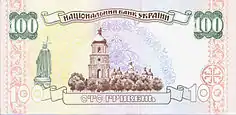 |
₴100 | Rose and green | Taras Shevchenko (old portrait) | The Saint Sophia Cathedral in Kyiv | |||||
 |
 |
₴200 | Blue | Lesya Ukrainka | The Entrance Tower of Lutsk Castle | 22 August 2001 | ||||
| These images are to scale at 0.7 pixel per millimetre. For table standards, see the banknote specification table. | ||||||||||
Third Series
| Denomination and dimensions | Image | Main colour | Obverse | Reverse | First printing | Date of issue | Withdrawal | |
|---|---|---|---|---|---|---|---|---|
| 1 hryvnia 118 x 63 mm |
 |
 |
Grey | Volodymyr the Great of Kyiv (c. 958 – 1015), Prince of Novgorod and Grand Prince of Kyiv Ruler of Kyiv Rus in (980–1015) |
Volodymyr I's Fortress Wall in Kyiv | 2004 | 1 December 2004 | 1 October 2020 |
| 1 hryvnia 118 x 63 mm |
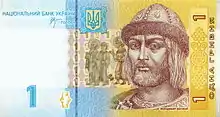 |
 |
Yellow-blue | Volodymyr the Great of Kyiv (c. 958 – 1015), Prince of Novgorod and Grand Prince of Kyiv Ruler of Kyiv Rus in (980–1015) |
Volodymyr I's Fortress Wall in Kyiv | 2006 | 22 May 2006 | |
| 2 hryvni 118 x 63 mm |
 |
 |
Orange | Yaroslav the Wise (c. 978 – 1054), Prince of Novgorod and Grand Prince of Kyiv Ruler of Kyiv Rus in (1019–1054) |
The Saint Sophia's Cathedral in Kyiv | 2004 | 24 September 2004 | |
| 5 hryven' 118 x 63 mm |
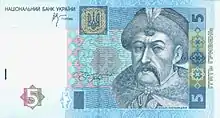 |
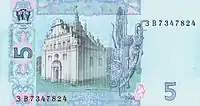 |
Blue | Bohdan Khmelnytsky (c. 1595 – 1657), Hetman of Ukraine | A church in the village of Subotiv | 14 June 2004 | Current | |
| 10 hryven' 124 x 66 mm |
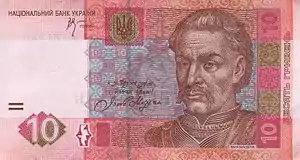 |
 |
Crimson | Ivan Mazepa (1639 – 1709), Hetman of Ukraine | The Holy Dormition Cathedral of the Kyiv Perchersk Lavra | 1 November 2004 | ||
| 10 hryven' 124 x 66 mm |
 |
 |
Crimson | Ivan Mazepa (1639 – 1709), Hetman of Ukraine | The Holy Dormition Cathedral of the Kyiv Perchesk Lavra | 2006 | August 2006 | |
| 20 hryven' 130 x 69 mm |
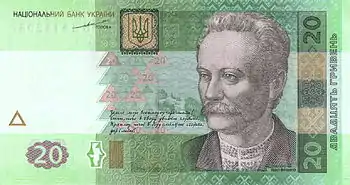 |
 |
Green | Ivan Franko (1856 – 1916), poet and writer | The Lviv Theatre of Opera and Ballet | 2003 | 1 December 2003 | |
| 50 hryven' 136 x 72 mm |
 |
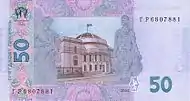 |
Violet | Mykhailo Hrushevskyi (1866 – 1934), historian and politician. | The Tsentralna Rada building (currently, Teacher's House in Kyiv). | 2004 | 29 March 2004 | |
| 100 hryven' 142 x 75 mm |
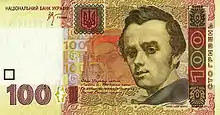 |
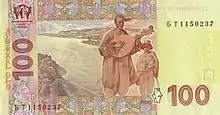 |
Olive | Taras Shevchenko (1814 – 1861), poet and artist | The Chernecha Hill near Cherkasy and the figures of a kobzar with his guide boy. | 2005 | 20 February 2006 | |
| 200 hryven' 148 x 75 mm |
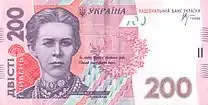 |
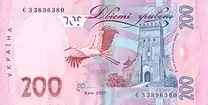 |
Pink | Lesya Ukrainka (1871 – 1913), poet and writer | The Entrance Tower of Lutsk Castle. | 2007 | 28 May 2007 | |
| 500 hryven' 154 x 75 mm |
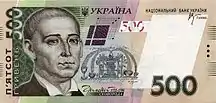 |
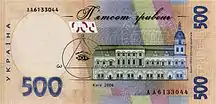 |
Brown | Hryhorii Skovoroda (1722 – 1794), writer and composer | The Kyiv Mohyla Academy buildings. | 2006 | 15 September 2006 | |
Fourth series
| Denomination and dimensions | Image | Main colour | Obverse | Reverse | First printing | Date of issue | |
|---|---|---|---|---|---|---|---|
| 20 hryven' 130 x 69 mm |
 |
 |
Green | Ivan Franko (1856 – 1916), poet and writer | The Lviv Theatre of Opera and Ballet | 2018 | 25 September 2018 |
| 50 hryven' 136 x 72 mm |
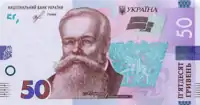 |
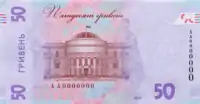 |
Violet | Mykhailo Hrushevskyi (1866–1934), historian and politician. | The Tsentralna Rada building ("House of the Teacher" in Kyiv) | 2019 | 20 December 2019 |
| 100 hryven' 142 x 75 mm |
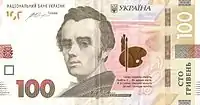 |
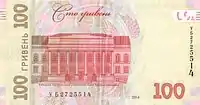 |
Olive | Taras Shevchenko (1814 – 1861), poet and artist | Red University Building. | 2004 | 9 March 2015 |
| 200 hryven' 148 x 75 mm |
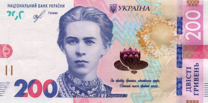 |
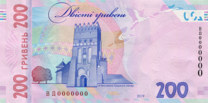 |
Blue and violet | Lesia Ukrainka (1871–1913), poet and writer | Entrance Tower to Lutsk Castle | 2019 | 25 February 2020 |
| 500 hryven' 154 x 75 mm |
_%D0%B0%D0%B2%D0%B5%D1%80%D1%81.jpg.webp) |
_%D1%80%D0%B5%D0%B2%D0%B5%D1%80%D1%81.jpg.webp) |
Brown | Hryhorii Skovoroda (1722 - 1794), writer and composer | The Kyiv Mohyla Academy buildings. | 2015 | 11 April 2016 |
| 1,000 hryven' 160 x 75 mm |
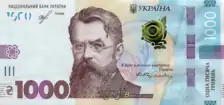 |
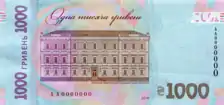 |
Violet | Volodymyr Vernadskyi (1863 - 1945), historian, philosopher, naturalist and scientist | National Academy of Sciences of Ukraine | 2019 | 25 October 2019 |
References
- "How hryvnia was born". Archived from the original on 2011-08-22. Retrieved 2014-03-13. Podrobnosti.ua (in Russian)
- "The man who designed Hryvnia". Archived from the original on April 23, 2008.. Dzerkalo Tyzhnia (in Russian)
- "Hryvnia-Immigrant". Archived from the original on 2010-12-29. Retrieved 2014-03-13. Dzerkalo Tyzhnia (in Ukrainian)
- National Bank names banknotes forged most often, UNIAN (08 June 2018)
